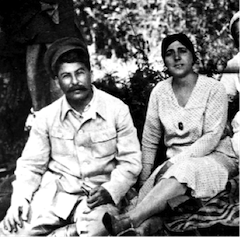

|
The Riutin Platform It was the groundswell of anti-Stalin feeling in the rank and file that made the emergence of opposition factions in the Party leadership so dangerous to the Stalinist regime. The most important faction was led by Martemyan Riutin, an Old Bolshevik and follower of Bukharin, who circulated copies of a 194-page manifesto entitled 'Stalin and the Crisis of the Proletarian Dictatorship' (known as the Riutin Platform) in which he delivered a blistering critique of Stalin's politics and personality, denouncing him as a mediocre theoretician, an 'unscrupulous intriguer' and, through his disastrous policies, the 'gravedigger of the Revolution'. Calling itself 'The League of Marxist-Leninists', the Platform accused Stalin of 'breaking with Leninism and perpetrating violence against both the Party and non-Party masses'. It demanded an end to collectivization, a slow-down of industrialization, and the reinstatement of expelled Party members on the Right and Left (including Trotsky and his followers). In a separate 'Appeal' to the Bolsheviks, Riutin called for the overthrow of the Stalinist dictatorship. The manifesto and appeal circulated among Party members. Betrayed by an informer in their midst, Riutin and his followers were arrested by OGPU: 24 of them were expelled from the Party and exiled from Moscow. Several other Bolsheviks, including Kamenev and Zinoviev, were expelled from the Party and exiled for simply knowing of the Platform's existence and failing to report it to the police. Riutin was sentenced to ten years in prison. In 1937, on Stalin's personal orders, he was shot. The Riutin Affair set Stalin on his way to the Great Terror. It left him with a paranoid conviction that 'enemies' were everywhere. He became obsessed by the memory of the criticism he had faced in 1932 and by his desire for vengeance not just against his critics but against those moderates in the Party leadership who had prevented him from dealing them a mortal blow. In the coming years the leadership referred repeatedly to the 'new situation' - a massive plot against the government - that had begun in 1932. And in the 'great purge' of 1937-38 a large number of the victims were accused of having being been involved in the Riutin Affair.  Stalin and Nadezhda Allilueva Stalin's paranoia was fuelled by personal tragedy. His second wife, Nadezhda Allilueva, committed suicide after arguing with Stalin at a dinner to celebrate the fifteenth anniversary of the Revolution on 7 November 1932. She left behind a note, which, according to their daughter Svetlana, was not only personal but political, 'full of reproach and accusations', in which she said she was opposed to everything that was going on. From that moment, according to Svetlana, Stalin trusted nobody. |
© 2014 Orlando Figes | All Rights Reserved